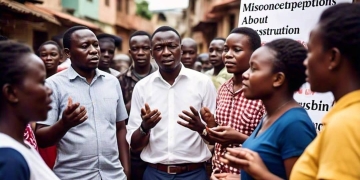Nursery/kindergarten (duration: three years) – Children
This is the pre-school level of education in Uganda. Children usually start at the age of three and complete nursery school by the age of six. Until recently rural areas like Katine sub-county did not have nursery schools. But more and more villagers, inspired by the early start in the education of children in towns, are wanting nurseries for their children. Katine has at least one nursery, located within the premises of a charitable organisation.
Primary school (duration: seven years)
In areas like Katine, most children never attend nursery; they start their education at the age of five or six at the nearest primary school. In Uganda, there are seven primary school years, from primary one to primary seven. With normal annual progression this means primary school should last seven years, but many pupils drop out part way through and return later, so it is not unusual to find teenagers sitting primary exams.
At the end of primary seven, pupils sit their first major national exams – the primary leaving examinations (PLE). Presently PLE has four examinable subjects – English language, mathematics, science and social studies. The best possible mark pupils can achieve is a total of four (which means one point – a distinction – in each subject), while the worst is a total of 36 (nine points for each subject, which means a fail).
Students with between four and 12 points pass the PLE with a first grade, or division one.
Those with scores between 13 and 23 get a second grade; 24 to 29 get a third grade, while those with 30 to 34 pass with a fourth grade.
Katine has at least 13 primary schools with a few other little community-owned schools not yet recognised by the government. For the last three years Katine sub-county has not had a single candidate passing the PLE in grade one. This year the top student passed with 13 points, in second grade, just one away from the top scores. Last year, the best candidate achieved 14 points.
Primary school tuition has been free in government schools in Uganda since 1997. But pupils, especially those in rural areas like Katine, face serious challenges to finishing their education – for example, they lack scholastic materials, like books and pens, they often have to study all day on an empty stomach since no meals are provided at school, and schools often have poor teaching methods.
Besides government schools, there are many expensive day and boarding private schools at all levels, where wealthier or more ambitious parents send their children.
Secondary school (duration: six years)
Pupils who pass their PLE can progress to secondary school. This has two stages; the first four years, senior one (S1) to senior four (S4), constitute the O-level period. At the end of S4, students sit the second major national exams known as the Uganda Certificate of Education (UCE) or simply O-level examinations.
Students who pass their O-level exams may progress to A-levels or the Higher School Certificate (HSC). This lasts two years, S5 and S6, after which students sit for the Uganda Advanced Certificate of Education (UACE) examinations, also known simply as A-levels. All these three annual national exams are sat between October and December.
Katine has only one secondary school and at present it is only able to offer education up to O-levels. The government abolished tuition fees in public secondary schools in 2007 to increase access. However, only students who have scored 28 points or higher can be admitted to this universal secondary education programme.
University and other tertiary institutions
Students who pass their A-levels may choose to progress to university, where they can study for degrees, or to other tertiary institutions that award diplomas and certificates. Some wealthier parents send their children to universities and colleges abroad.
The government gives about 4,000 university scholarships each year, and sponsors thousands of other students in other tertiary institutions. But tens of thousands of students who do not get the competitive government scholarships depend on their parents and guardians to pay their tuition and upkeep.
Some tertiary institutions, like primary teachers’ colleges and some nursing schools, also admit students who have only completed their O-levels.
Obtained from The Guardian and written by Richard Kavuma.















